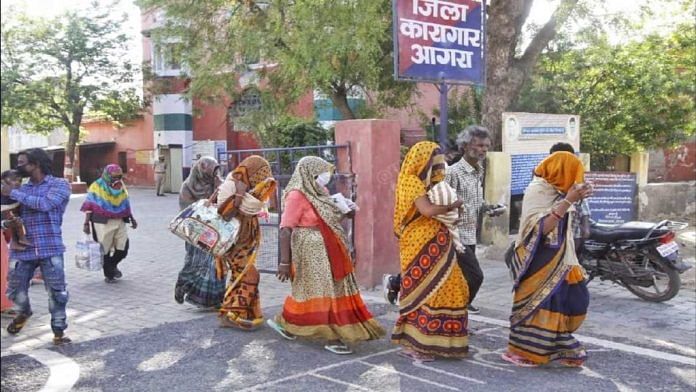New Delhi: Irregular meetings with mothers, bullying, no care for those with special needs, improper access to education — the list of problems faced by children of women prisoners in Indian jails (who have no other caregivers) are many and varied, according to a study conducted by the National Commission for Protection of Child Rights (NCPCR).
A statutory body under the Ministry of Women and Child Development (WCD), the NCPCR is tasked with ensuring “that all laws, policies, programmes, and administrative mechanisms are in consonance with child rights” as defined in the Constitution.
The study, the “Education Status of Children of Women Prisoners in India”, published Tuesday, surveyed the condition of both children living in jails with their mothers and those who have been put in institutional care.
Although the primary focus of the study was the children’s access to education, the findings highlight other gaps in their care and upkeep that require attention.
The survey was conducted across eight jails — the Nari Bandi Niketan in Lucknow, District Jail in Ghaziabad, Special Prison for Women in Rajahmundry and Kadapa, Beur Jail in Patna, Shaheed Khudiram Bose Jail at Muzaffarpur, Byculla jail in Mumbai, and Yerwada Jail in Pune — and 15 childcare institutions in four states, Bihar, Maharashtra, Uttar Pradesh, and Andhra Pradesh.
All visits to prisons and childcare institutions were made between August 2019 and January 2020. The surveyors spoke to more than 100 respondents, of whom 58 were women prisoners living with their children in the age group of 3-5 years. Thirty-five of those spoken to were women prisoners’ children aged 6-18 years living in children’s homes and hostels. The study also included the responses of 26 children’s home and hostel superintendents or in-charges, 17 heads of schools attended by children of women prisoners, and eight prison officials.
“A key finding of the study is that children of women prisoners — both those living in prison with their mothers and those in institutional care — do not have proper access to education,” said NCPCR chairman Priyank Kanoongo in a preface to the report.
Also read: Gurugram woman’s petition brings back focus on prisoners’ conjugal rights
Irregular meetings
According to Supreme Court guidelines issued in 2006, children of women prisoners should be allowed to meet their mothers at least once a week. However, 60 per cent of the respondents said visits from their children are very irregular. Seventeen per cent said they meet on a quarterly basis, while 10 per cent of the women prisoners interviewed said they get to meet their children once a week, and 13 per cent said they have never met their children in prison.
The study also found that data on children of women prisoners have not been updated. In Byculla, for instance, not only was the list of children of women prisoners dated, but details of childcare institutions where these youngsters had been sent had not been updated, which would make it impossible for the prisoners to keep track of their children, the study noted. In Bihar, the study added, jail officials were clueless about the fact that some children of women prisoners were not even in institutional care, and were out on their own without any adult supervision.
The condition of children with special needs is especially critical, the study said, adding that there are few facilities that cater to them. In Pune, for example, the surveyors found that prisoners’ children with cerebral palsy had been put in an institution that did not have the facility to care for them, owing to which they were not even enrolled in school. The NCPCR has written a letter to the Pune District Magistrate to shift these children to homes for children with special needs.
Also read: Delhi has 75% more prisoners than capacity, 69% of all prisoners in India are undertrials
Bullied in school
Of the 34 children interviewed for the study, 85 per cent were found to have been enrolled in schools near the care facilities where they resided, while 9 per cent were pursuing their education through the National Institute of Open Schooling (NIOS). Six per cent of the children interviewed said that they had no access to education.
Just being admitted to schools, however, does not ensure their development, the study said, noting that proper attention needs to be given to their emotional and psychological wellbeing. In Lucknow, children enrolled in schools complained about being bullied by other students because their mothers were in prison.
In another instance, the commission retrieved 26 Bibles from a childcare institution in Ghaziabad that was allegedly imparting Christian studies to children of different religions.
Also read: This is how prisons across India plan to release and track 34,000 inmates
The road ahead
The NCPCR has advised the governments in the states where the study was conducted to align their prison manuals with the guidelines given in the National Model Prison Manual 2016. It has also recommended that the respective departments of prisons ensure that staff are sensitised to child rights and that data on childcare institutions are updated.
Proper attention has also been advised for children with special needs living with their mothers in prison — disability certificates should be issued to them and benefits of ‘disability pension’ extended, the NCPCR noted.
“Children of women prisoners are vulnerable. They should receive the benefits of the Juvenile Justice Act and Right To Education Act. We request all jail authorities and states to follow JJ Act guidelines to ensure that the rights of these children are not disregarded and that they have access to free and compulsory education,” Kanoongo told ThePrint.
(Edited by Poulomi Banerjee)
Also read: New book reveals the complex lives of death row inmates and their families



